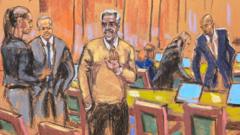In a recent decision, a divided federal appeals court disallowed a plea deal for Khalid Sheikh Mohammed and his co-defendants, maintaining the possibility of a trial instead of a life sentence without parole.
Court Denies Plea Deal for 9/11 Attacks Figure Khalid Sheikh Mohammed

Court Denies Plea Deal for 9/11 Attacks Figure Khalid Sheikh Mohammed
Appeals court rejects agreement that could have spared life sentences for the alleged mastermind of the 2001 attacks.
In a closely watched legal case, Khalid Sheikh Mohammed, accused of orchestrating the September 11, 2001, attacks, saw his plea deal rejected by a federal appeals court in Washington DC. The agreement, which sought to allow Mohammed and other defendants to plead guilty in exchange for life sentences without the possibility of parole, was overturned in a 2-1 ruling. This agreement would have enabled the families of the 9/11 victims to question Mohammed directly.
The 2001 attacks resulted in the deaths of nearly 3,000 individuals when hijacked planes crashed into the World Trade Center and the Pentagon. Following his capture in Pakistan in 2003, Mohammed was detained in Guantanamo Bay, where he has been held since. The plea deal sparked a divide among victims' families, with some advocating for a trial to seek justice and unveil more details about the attacks, while others saw the plea agreement as a potential path toward closure.
Negotiations for the plea deal, which lasted over two years, had received approval from military prosecutors and senior Pentagon officials before it was unexpectedly challenged. The agreement faced complications due to revelations about the torture Mohammed endured in CIA custody, employing techniques such as waterboarding and other controversial methods.
Although initial approvals were made, the Biden administration's reversal came quickly, as Defense Secretary Lloyd Austin intervened, asserting his authority over such negotiations. He emphasized the public's right to witness military commission trials, a stance upheld by the appeals court, which affirmed Austin's decision. The judges noted his legal authority in denying the plea deal, citing the importance of transparency for victims' families and the American public.
Despite this legal battle, dissenting Judge Robert Wilkins contended that the government had not sufficiently demonstrated any judicial error in the process. As the case against Mohammed continues, it remains a focal point of national interest and legal scrutiny, keeping the issues surrounding justice for the victims of 9/11 in the spotlight.
The 2001 attacks resulted in the deaths of nearly 3,000 individuals when hijacked planes crashed into the World Trade Center and the Pentagon. Following his capture in Pakistan in 2003, Mohammed was detained in Guantanamo Bay, where he has been held since. The plea deal sparked a divide among victims' families, with some advocating for a trial to seek justice and unveil more details about the attacks, while others saw the plea agreement as a potential path toward closure.
Negotiations for the plea deal, which lasted over two years, had received approval from military prosecutors and senior Pentagon officials before it was unexpectedly challenged. The agreement faced complications due to revelations about the torture Mohammed endured in CIA custody, employing techniques such as waterboarding and other controversial methods.
Although initial approvals were made, the Biden administration's reversal came quickly, as Defense Secretary Lloyd Austin intervened, asserting his authority over such negotiations. He emphasized the public's right to witness military commission trials, a stance upheld by the appeals court, which affirmed Austin's decision. The judges noted his legal authority in denying the plea deal, citing the importance of transparency for victims' families and the American public.
Despite this legal battle, dissenting Judge Robert Wilkins contended that the government had not sufficiently demonstrated any judicial error in the process. As the case against Mohammed continues, it remains a focal point of national interest and legal scrutiny, keeping the issues surrounding justice for the victims of 9/11 in the spotlight.






















